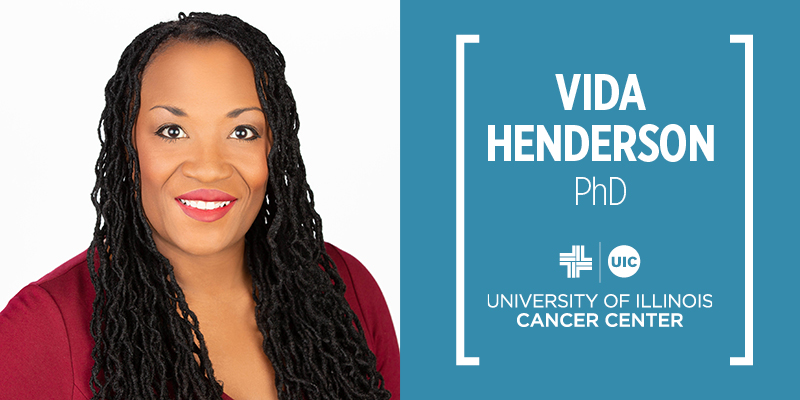
Hurricane Katrina took everything from Vida Henderson but her car, a pair of jeans, two tank tops and a pair of flip flops. But the catastrophic event that killed more than 1,000 people and caused $125 billion in damages in August 2005 gave her something when she thought all was lost: The understanding of how the environment and social circumstances impact physical and mental health, and how they interconnect with health disparities.
Henderson, the recently named director of the University of Illinois Cancer Center’s Community Engagement and Health Equity office (formerly known as the Office of Community Engaged Research and Implementation Science, or OCERIS), will oversee research studies and screening and navigation initiatives that will engage communities within the UI Cancer Center’s catchment area to decrease the burden of — and increase the awareness of — cancer and its access to early detection and prevention.
The CEHE team thoroughly investigates the needs of the community members and develops services and research opportunities responsive to those requests, said Henderson, PhD, PharmD, MPH, MFA, who also serves as senior research scientist. CEHE is under the auspices of the UI Cancer Center’s Community Outreach and Engagement efforts led by Karriem Watson, DHSc, MS, MPH, who also serves as associate executive director of UI Health Mile Square Health Center.
Over the next two years, Henderson and her colleagues will focus on four areas:
- The development of strategic partnerships between the community and academia to develop and apply research conducted by UI Cancer Center members
- Conducting best practices related to community-based cancer screening, prevention, education and navigation relevant to the UI Cancer Center’s catchment area to reduce the burden cancer places on patients
- Identify, develop and guide policy recommendations that are relevant to the UI Cancer Center’s catchment population, Federally Qualified Health Centers, community organizations and other cancer care stakeholders
- Guide research and development through community outreach and engagement collaborations and dissemination of findings to community stakeholders and UI Cancer Center programs (Cancer Biology, Translational Oncology, and Cancer Prevention and Control)
Prior to her new role, Henderson served as principal investigator or co-investigator of numerous UI Cancer Center grants, which includes cancer screening and patient navigation programs, health systems intervention initiatives, and research.
“I absolutely love research, but a highlight during my time at the Cancer Center has been our screening and navigation programs, which are service-based programs that help inform our research studies,” said Henderson, who has been at the UI Cancer Center since July 2017. “A number of community members that we serve may not have received their breast cancer screening, colorectal cancer screening, or stopped smoking if it weren’t for our patient navigators and the services that we are able to provide to patients, particularly those who are uninsured and underinsured.
“It is unfortunate how many women wait until they have a lump or pain in their breast to be seen by a provider simply because they didn’t have insurance or citizenship documents, or were afraid. Our Mi-MAMO breast cancer screening program is fueled by so many people at UI Health, the UI Cancer Center, community organizations, and funding groups that make it possible to serve these patients. Everyone is so dedicated and always put the needs of the patient first. It has been a very humbling and rewarding experience working with this program.”
A native of Louisiana, Henderson was working as a clinical pharmacist in New Orleans when Hurricane Katrina breached the city’s levees, leaving 80% of the city underwater, with some parts being submerged by as much as 15 feet of water. With devastation all around her, Henderson decided to turn a negative into a positive.
“The thing that helped me the most was volunteering and helping others who were in worse situations than I was,” Henderson said. “This experience led me to discover the public health field.”
The daughter of a prostate cancer survivor, Henderson believes conducting cancer disparities research and implementing health equity initiatives are important not only to others, but to her as well.
“I know that everything that I’ve done and accomplished — my freedom, my comforts — are all because someone fought for me to have them,” she said. “As a person of color and as a woman from rural southern Louisiana, it is inherent in me to want to do my little part in helping others and try to improve their lives in some small way.”
